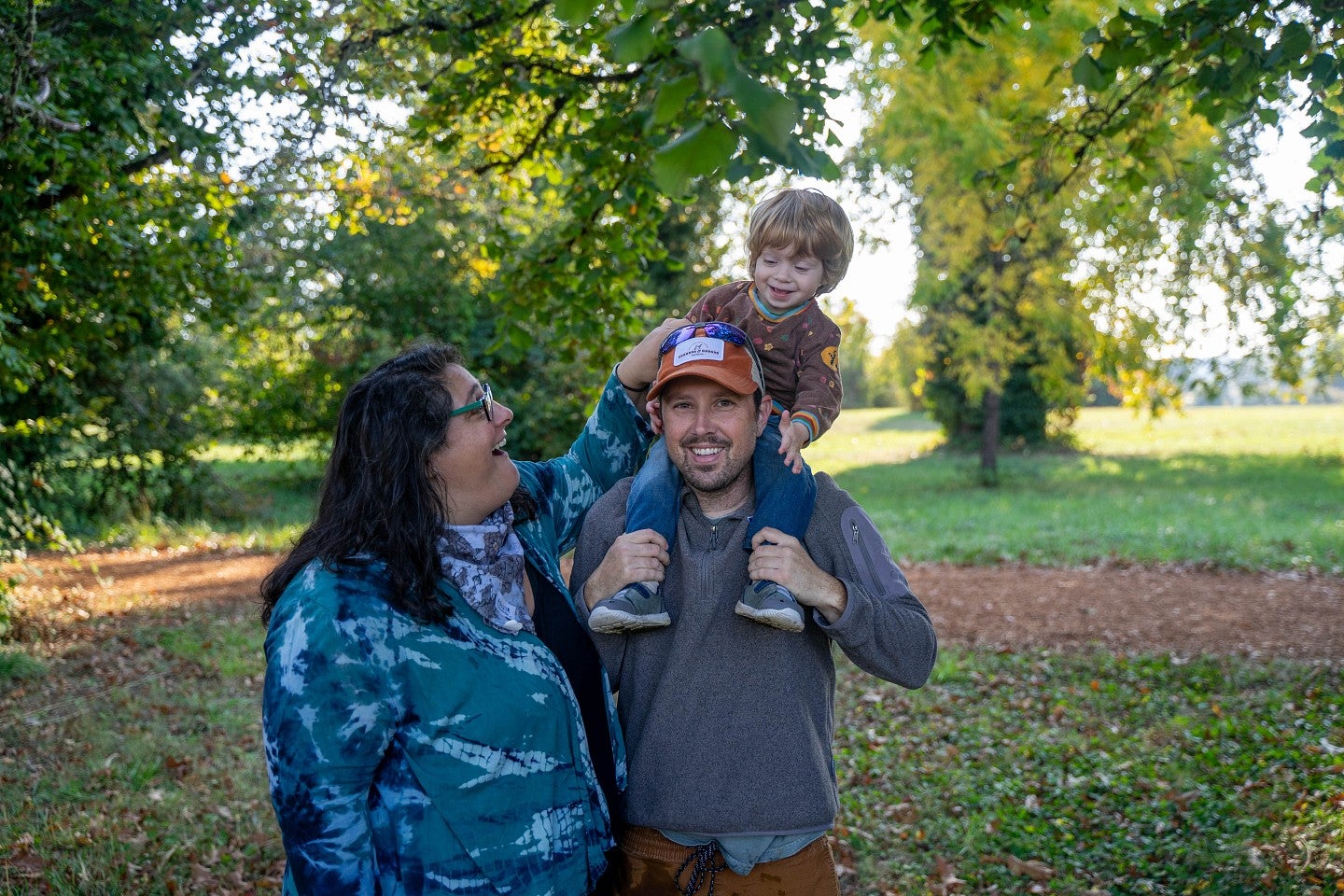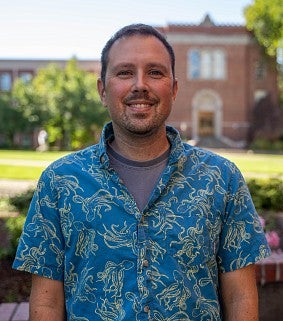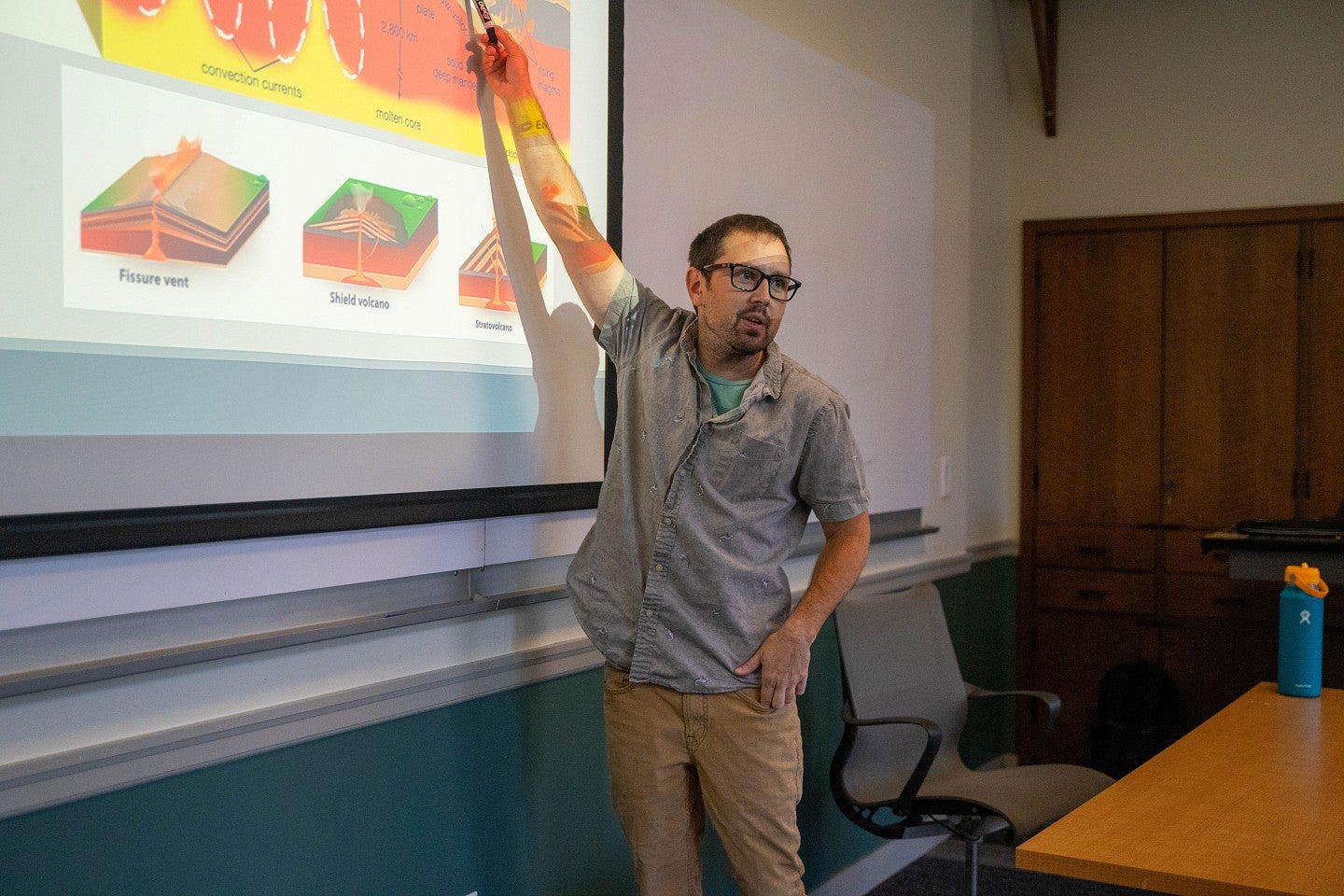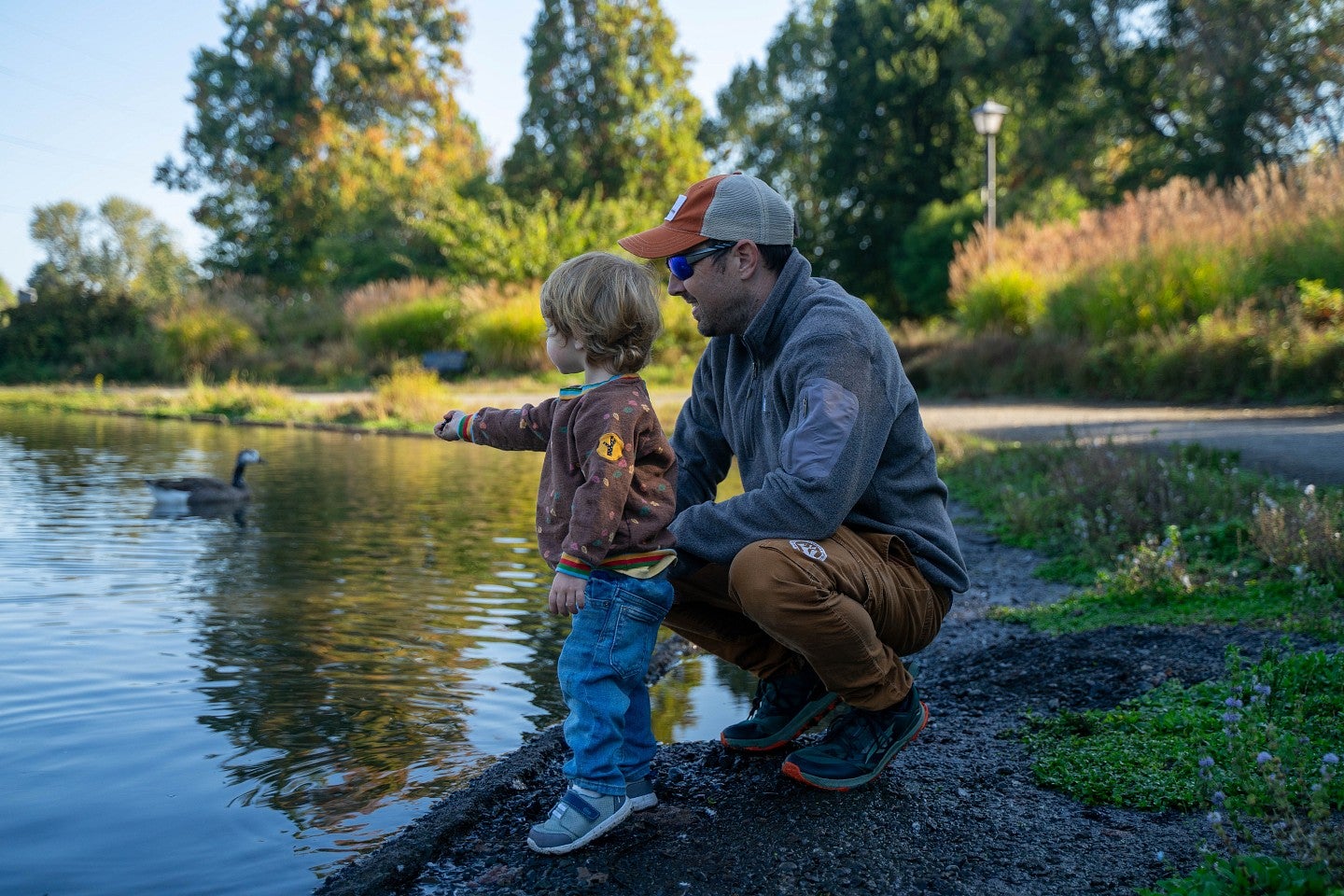
Nature and nurture

Guilty Pleasure: I don't know that I feel super guilty about it, but I love video games and D&D.
Favorite Movie: I like any movie that is funny or has elements of fantasy or science fiction. Dungeons & Dragons: Honor Among Thieves ticked a lot of those boxes. The old (and new) Ghostbusters and Star Wars movies are all good too.
Coffee or Tea: Definitely tea. I pretty much only like coffee if it is disguised in the form of a milkshake.
What's in the fridge: Ingredients to make a smoothie.
It’s 2018 off the coast of Mexico, and a Category 4 hurricane is violently rocking the research vessel, Oceanus. Chief scientist Jesse Wilson is onboard, amidst the distress and stomach-churning of the crew.
The storm has scuttled the crew’s research plans and tells them it will be a three-day trip back home in horrendous conditions. People are already dropping like flies. Most choose to stare at the stormy horizon or bend over a trash can to vomit. Those who aren’t sick are cooped up, trying to sleep through the rest of the journey.
Wilson’s mind is elsewhere. Hiding out in his quarters, he creates a role-playing, murder mystery game. Given the miserable surroundings, his game presents the best chance for normalcy. Helping those around him has been occupying his mind since the excursion went awry.
He’s made a unique character and backstory for every person on the ship. One of them is the murderer. He walks to the public chambers and tapes it to the wall.
“He had everyone playing ridiculous characters,” recalls Mike Beman, Wilson’s co-leader of the expedition who remembers how this game helped divert many of the crewfrom being sick or scared. “I don’t know anyone who would have done that during a hurricane.”
Keeping people engaged and focused remains at the forefront of Wilson’s life . But this time he has a different set of audiences. As a new core faculty member at the Clark Honors College, Wilson is guiding students through the natural sciences as an instructor.
Murder or not, mysteries are Wilson’s tool of choice. “Life is a puzzle,” he says. “Learning isn’t listening to facts and memorizing them. It’s uncovering a mystery. I want to show my students that they can solve a part of this puzzle.”
At the same time, Wilson is deciphering the puzzle of fatherhood. He is the parent of 2-year-old Riley, and Wilson is leaning on his own childhood experiences as he works to support his child’s individualism. “I want to give Riley everything I didn’t have,” he says.
As he adjusts to his roles, Wilson has made a point to hone his teaching style, and he pushes to convince his students to care about the natural world around them.
“These students know how to learn, and it’s changing the way I can engage with them,” he says. “The biggest challenge educators face is realizing that you also have to teach students how to learn. And these students already know how to learn.”

Born and raised in California
Wilson was born in Goleta, California, the older of two children. Born to a contract negotiator and an engineer, Wilson and his younger sister grew up as latchkey kids. After school, they’d spend hours outside, exploring and playing with neighborhood kids until their parents got home from work. In typical sibling fashion, they were mortal enemies one minute and great friends the next.
Wilson recalls walking his dog through acres of floral grassland to the beach. In the winter, monarch butterflies gathered in the park for him to watch, amazed. He valued the solitude nature offers: “If I was lucky, I wouldn’t see another soul,” he recalls. “I loved exploring the natural world—with just myself.”
Having a younger sister, though, meant alone time was hard to come by. He spent time with her making forts, climbing trees, and catching lizards.
Wilderness excursions also served as a bonding opportunity for them and their father, who would take them on road trips to see natural wonders outside of Goleta. “All the camping, fishing and hiking,” he says, “It definitely inspired the love for field work.”
It wasn’t all sunshine and rainbow trout for Wilson. A health problem in his youth led to him skipping junior high; his time was consumed by doctor visits.
When he got to high school, it wasn’t easy for him. “I was two years behind academically and mentally younger than a lot of my peers,” he recalls. “My humor was stuck behind everyone else. I had a harder time understanding other people.”
Wilson remembers not liking science classes because of teachers’ insistence that lab work was more important than getting students out into nature.
It wasn’t until college, where he threw himself into field classes, that everything clicked. “I only started to like science when I saw that it could be done outside of a lab,” he says.
In 2004, he attended Cal State-Channel Islands, a new public university on the Central Coast in California. He remembers fondly the small class sizes and the attentive faculty members.
Wilson recalled how one of his professors who studied fish ignited his love of fieldwork. The professor brought Wilson and his classmates to a nearby wetland to catch fish, using large nets. He was one of the resolute few who dared to wade through the quicksand-like mud to catch a fish. “We didn’t catch anything. It was kind of a disaster, but it was so much fun,” he remembers. “Everyone who got in the mud was grinning, and I realized that I wanted to be in the field, doing crazy things in nature, for the rest of my life.”
Wilson graduated with a degree in environmental systems and then went to University of California-Merced where he worked in a lab run by Beman from the Oceanus.
Beman, a professor of environmental sciences, had scouted Wilson during his undergraduate years. “His recommendation letter said, ‘I haven’t encountered a student like this in 30 years,’ so that gives you an idea of how special Jesse was,” Beman recalls.
At the same time, Wilson met Sarah Abboud, the woman he would eventually marry, and they became friends. Everything changed when a stray border collie mix he called Mokey showed up on Wilson’s lawn. “I lived in a house with a bunch of other guys and the landlord was like, ‘No pets!’” he says. “I knew I couldn’t have this dog, so Sarah took Mokey.”
“He has such an incredible enthusiasm and curiosity, for his students, for the world around him. And it’s infectious.”
Going to Palau
Abboud saw it as an opening. “I didn’t know if he really liked me at all, and then I adopted Mokey,” she recalls. It was, she says, partly to keep Mokey off the street, but also it was kind of an excuse to have (Wilson) over all the time at my house.”
It was around this time that the Beman lab sent Wilson halfway across the world to Palau, where he assessed how microbes and environmental conditions affected the ecosystem of marine lakes.
“When he went to Palau on his own, for the first time, I think that’s when he realized that he really liked me,” Abboud says now.
For Wilson, Palau was a tropical paradise. But the team was designated to collect and process data under conditions that would be difficult for anyone. Tropical storms, sharp rocks, thick vines and poisonous plants—it was a tricky environment.
“Everyone who goes there has multiple moments where they say, ‘I need a break. I need to just sit in the air conditioning and watch TV for a day,’” Beman recalls. “But not Jesse. You would have thought he walked on water.”
As for Wilson’s then-developing relationship with Abboud, both describe it as a “slow burn.” Gradually, they spent more time together until they were almost inseparable. Hunting for banana slugs might not sound like the picturesque idea of romance. But for two scientists (Abboud was studying biology in graduate school), there was no greater bonding activity.
They have been married since 2019. Wilson is stubbornly modest, in both demeanor and substance, and Abboud picks up the pieces. It’s not uncommon for her to say: “He won’t say this about himself, so I will.”
He taught at University of California-San Diego and California State University-San Marcos as an adjunct professor but struggled with being assigned classes outside of his specialty area with more than 100 students in them. “It was very sink or swim, and not fun,” he says.
In 2022, Abboud became pregnant.
“When he was expecting his kid,” Beman recalls, “I told him: ‘Jesse—if you’re half as good a dad to your kid as you are to your dog, you’re gonna have the most loved kid in the world.’”
Becoming a parent presented an all-too-familiar challenge for Wilson, in the form of health scares.
When Riley was born, the child was in the 20th percentile for weight—and rapidly dropping. A milk protein allergy coupled with chronic acid reflux jeopardized this otherwise healthy baby. “At one point, they were less than the first percentile for weight,” Wilson recalls. “It was terrifying and stressful. We were in and out of appointments all the time; nutritionists, occupational therapists and pediatricians.”
After an extended period of time, Riley outgrew the health problems, and Wilson started looking for teaching opportunities that would satisfy his needs long term.
The Clark Honors College had openings and the decision to apply for Wilson was a no-brainer. With small class sizes, discussion-based curricula, and an innovative community, he felt like he would fit right in.
“He’s constantly thinking critically about his teaching and making adjustments to ensure that what he’s doing is effective for the students he is working with,” says Daphne Gallagher, Associate Dean of undergraduate studies for the CHC. “He has such an incredible enthusiasm and curiosity, for his students, for the world around him. And it’s infectious.”

Attention to students
Wilson remembers having a student at Merced who would come to office hours to pepper Wilson with more questions. When it came time for the student to declare a major, Wilson asked him if he was going to pick earth sciences. The student told him he wouldn’t, and when Wilson asked why, he struggled with the answer. "He told me that he was gay, and he doesn’t see anyone like him in this field,” Wilson recalls. “So afterwards, I made sure to highlight queer scientists and their accomplishments in my class.”
To this day, Wilson doesn’t know if that student ever changed his mind. But he never wants representation to deter his students from exploring the natural world.
“He asks us how we can relate what we’re learning about the earth to our majors,” says Penelope Burian, a CHC sophomore in Wilson’s “HC 241 The Habitable Earth.” “It’s been really nice to see that kind of learning in a context that can actually relate to me.”
It’s been a whirlwind for the Wilson-Abboud family. When he got the Honors College job, his wife had to scramble to relocate from San Diego to Eugene in August, just weeks before work started for him.
“We’re definitely feeling a little uprooted. But we’re with each other,” says Abboud.
Riley is loud, confident and boisterous. Wilson describes them as “knowing what they want and being loud about it.”
On a recent trip to Alton Baker Park, Riley and Mokey lunge toward a goose that paddles too close to them for Wilson’s liking. He scoops Riley into his arms, while Abboud braces herself as she tries to pull Mokey back with his leash.
He uses his experiences in the classroom to inform his role as a parent, acknowledging that even when you plan for things, sometimes they can change. His message: Don’t panic.
“You can plan as much as you want, and read as much as you want, but a kid is a kid,” Wilson says. “They will throw your planning out the window.”
